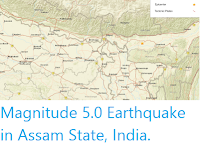The United States Geological Survey recorded a Magnitude 7.3 Earthquake at a depth of 10.0 km, in southern Qinghai Province, China, slightly before 2.05 am local time on Saturday 22 May 2021 (slightly before 6.05 pm on Friday 21 May, GMT). The event is reported to have led to the collapse of two bridges and damage to numerous buildings, with five people injured and several thousand to temporarily evacuate their homes.
The approximate location of the 22 May 2021 Qinghai Earthquake. Google Maps.Qinghai Province lies on the northeast of the Tibetan Plateau, a vast upland created by the impact of India and Eurasia; Earthquake on the Tibetan Plateau is due to the impact of India into Eurasia to the south. The Indian Plate is moving northwards at a rate of 5 cm per year, causing it to impact into Eurasia, which is also moving northward, but only at a rate of 2 cm per year. The collision of the Indian and Eurasian plates has lead to the formation of the Himalayan Mountains, the Tibetan Plateau, and the mountains of southwest China, Central Asia and the Hindu Kush. The 32 highest mountains in the world are on the Plateau (the 33rd, Tirich Mir, is in the nearby Hindu Kush, Afghanistan). India is still moving northwards, but Eurasia is unable to do the same, resulting in an unusual degree of folding and uplift. This has resulted in a number of faults running east-west across the plateau, with sections being forced eastward into China.
See also...



Follow Sciency Thoughts on Facebook.
Follow Sciency Thoughts on Twitter.






